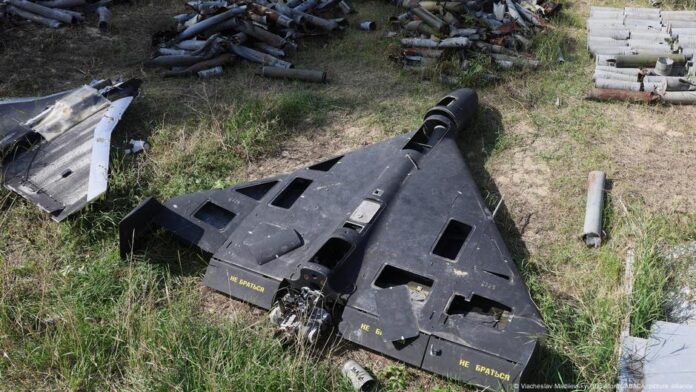Hardly a night goes by that Ukraine doesn’t come under aerial attack from Russia. Last Sunday night alone, almost 500 drones and rockets were fired at targets in Ukraine. As it turned out, in many of those missiles, there were Western-made components.
At the beginning of the week, Ukrainian President Volodymyr Zelenskyy pointed this out in a filmed message, noting that somehow high-tech componentry — circuit boards, microchips, sensors, converters, semiconductors and control units — had all made it to Russia, despite Western sanctions on the country.
After the attack on Sunday as many as 100,000 internationally-sourced components had been found in the wreckage of weapons and drones, he said. Many came from Germany and other European nations, as well as from the US and Taiwan originally.
Zelenskyy had some harsh words for his Western allies . Almost all of the components are actually on international sanctions lists and are not permitted to be exported to Russia.
“If certain countries cut off the blatantly reprehensible schemes of supplying Russia with critical components for the production of missiles and drones, the Russian threat will become drastically smaller,” the Ukrainian president argued in a message posted on social media site, X.
A convoluted route to Russia
“It should be noted that export controls on many of these goods were imposed right at the beginning of the major Russian offensive, in the spring of 2022,” said Benjamin Hilgenstock, a senior economist at the Kyiv School of Economics, or KSE, who focuses on international sanctions on Russia. “These controls have been tightened to some extent [and] expanded to include other product groups, but essentially they have existed for the entire duration of this war.”
In the past three and a half years, the EU has imposed 18 different packages of sanctions on Russia because of its 2022 full-scale invasion of Ukraine. In July, the EU also tightened up export restrictions on so-called “dual use” goods — that is, products that can be used for both civilian and military purposes.
Yet, according to Hilgenstock, many such goods are still finding their way to Russia, one way or another. Often there are a lot of intermediaries involved, for example, in China, the United Arab Emirates, Turkey or Kazakhstan.
“This means that in many cases, a Western company legally sells its component to a business partner in another country. That partner, in turn, then resells the component, and so on and so on, until eventually it ends up with someone who resells it and ships it to Russia,” the expert explained.
The problem is well known. It’s why the EU has started to sanction intermediaries in third countries, who are selling products onto Russia.
“But of course, this is a bit of a cat-and-mouse game,” Hilgenstock continued, “because it’s relatively easy to create a new intermediary just three doors down the same corridor.”
No way to inspect exports
In a study published in January last year, Hilgenstock and colleagues at the KSE analyzed the international sanctions regime against Russia.
Making things even more difficult is that many of the components are not even made in Western countries. “They may be manufactured by Western companies but not necessarily here [in the West], perhaps offshore in factories in Southeast Asia, for example,” Hilgenstock explained. “This means that some of these components never even physically pass through EU territory.” That’s a factor that makes it virtually impossible for EU customs or other authorities to inspect the exports, he said.
However all that doesn’t mean that sanctions are of no use whatsoever, Hilgenstock noted.
“We can’t be expected to prevent the export of every single computer chip to Russia,” he argued. “We also know that Russia pays dramatically higher prices for these parts, more than any other country in the world. And that in itself is a success because it means Russia gets significantly less for the same money, possibly even of poorer quality, and that everything takes longer, and there are repeated delays.”
Of course, there are improvements that could be made, he continued. The manufacturers of restricted goods should be better held accountable for controlling and securing their distribution networks, he suggested, and for ensuring sanctioned items don’t end up in Russia.
EU political will needed
The financial sector offered positive examples, Hilgenstock pointed out: “For decades, there have been very specific requirements in the financial sector regarding money laundering and funding of terrorism.”
Banks have invested significant resources into internal processes and checks that allow them to abide by those rules and requirements, so they know what kind of transactions they’re undertaking and with whom, he explained.
“We have got to get to the same point with this [sector]. But that’s a process, and it takes time,” Hilgenstoc conceded.
Additionally for this to happen,genuine political will to move forward is needed. And there’s no real consensus on this at European level, he said.
It’s not just the usual suspects — countries that often support Russia, such as Hungary or Slovakia — that have blocked such a process, he pointed out.
“Other nations — including Germany — are also not necessarily in agreement on more extensive due diligence for companies.”
His conclusion on sanctions on Russia: “There are still gaps, and these gaps could be closed.”
This article was originally published in German.
Source link






